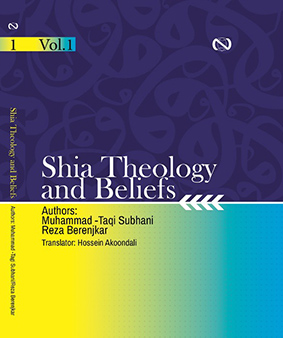Shia Theology and Beliefs
Shia Theology and Beliefs Vol.1
Authors:
Muhammad-Taqi Subhani
Reza Berenjkar
Translator: Hossein Akhoondali
“He who dies in his bed while he recognizes the rights of his Lord and the rights of His Messenger and his household, has died a Martyr, and Allah will surely reward him.”1 – `Alī b. Abī-Ṭalib
Foreword
It has been said that “A man is but the product of his thoughts. What he thinks, he becomes.” This statement isn’t completely true. Although the thoughts and beliefs of a man are some of the most important aspects of his identity and the fundamental building blocks of his life and reality, but man is a multi-dimensional being that has spiritual, moral, and innate aspects along with his thoughts and intellect.
Without doubt, most people act based on emotions instead of thought and reason. Thought and reason are a means of controlling one’s emotions and actions, however many actions and ambitions are born out of corrupt thoughts and incorrect reasoning. Although the different aspects of human reality influence man’s actions and his decisions in life and are the motivating forces that keep him going, it is correct beliefs and reasoning that results in the salvation of mankind.
The importance of having correct beliefs based on decent reasoning has been emphasized again and again in the teachings of God’s great Prophets and Messengers. The history of mankind testifies that only through correct beliefs and thoughts, men have ever made lasting changes in society. The distinguished and acclaimed figures that we know of today, were those who strived to renew the beliefs and thoughts of
the people of their times and even created new schools of thought altogether.
However, these new schools of thought have sometimes created new problems instead of solving the old ones. Many scientists put aside their common sense and conscience and opted to follow deductions based on wrong assumptions that sometimes lead to catastrophic results. It is here that the mission of God’s Messengers begins. By using intellect and the springs of common sense, they open a window to eternal and enlivening truths. In the school of the Ahl al-Bayt, the best means of recognizing the truth is the use of common sense in light of the Quran and pondering on religious scripture.
To reach this goal, and by the use of the same method that has been experienced and perfected in the science of discourse, the current lessons have been prepared in two volumes to be studied in two semesters by freshmen Islamic seminary students. The following points have been considered during the preparation of these lessons:
- The intended goal of the current course is to provide a general and concise outline of the most important beliefs of Shia Islam. The students are expected to gain an overall and rudimentary insight into Shia theology. The same topics will be examined in detail in subsequent volumes that will follow.
- Based on the planned curriculum, the topics that will be studied will help the students familiarize themselves with core Islamic concepts and beliefs. However, justifications based on aql and scripture have been provided wherever necessary to be used by students in debate sessions. In some cases, controversial issues that are usually the topic of heated debates have been given special attention.
- Textbooks must be developed using the results of contemporary research. The sources used in the current textbook are a mixture of
well-known Shia scripture and contemporary research treatises and works. These sources have been used and mentioned in the current book both as a gratitude to the authors of these works and as motivation for further research and study by the students. - A new teaching method has been employed in this textbook where each lesson starts with a very brief outline of the topic being discussed and at the end one or two research subjects are proposed. These subjects are appropriate for the more enthusiastic students and the teachers are advised to encourage them to make the results of their research available to the other students.
The current work was proposed and supervised by the “Office for Preparing Texts for the Islamic Seminary”1 [in Qom] and is the first course on beliefs that is taught to the students. The “Committee for Islamic Discourse” at the Center for Preparing Texts has supervised all steps taken to create this work from beginning to end. The first edition of this book was taught in a limited number of centers and the subsequent feedback was used to make a number of changes and corrections to the first edition. What you are reading is the third edition. We will happily accept any suggestions that will improve the current edition.
We are very obliged to express our gratitude to Sayyid Hamid Jazayeri the current director and to Reza Habibi the previous director of the “Office for Preparing Texts for the Islamic Seminary” and their colleagues whose efforts played a great role in completing this book. We would also like to thank the members of the “Committee for Islamic discourse” specially Abd al-Rahim Sulaymani, Rasul Razawi, and Abd al-Majid
Zahadat who assisted us with their suggestions in perfecting this book. We would also like to thank the authors Muhammad Taqi Sobhani and Reza Berenjkar who played the main role in creating this work and also their colleagues in the “Specialized Center for the Ma`arif of the Ahl al-Bayt” who were instrumental during the research and authoring phase of this work. The current work is the result of the group effort of all the aforementioned people.
We dedicate this work on behalf of all that had a role in completing this work to the greatest guide and teacher of humanity, Imam Mahdi. May God hasten his appearance.
The Committee for Islamic Discourse
The Office for Preparing Texts for the Islamic Seminary


